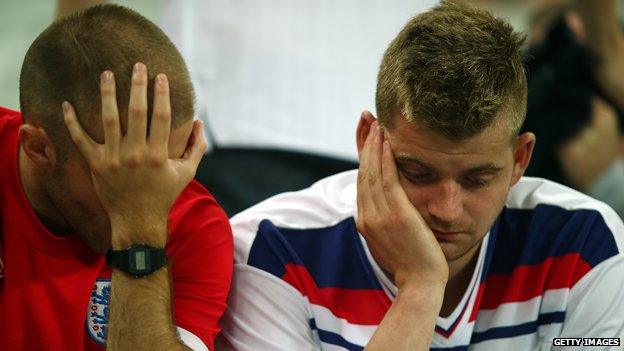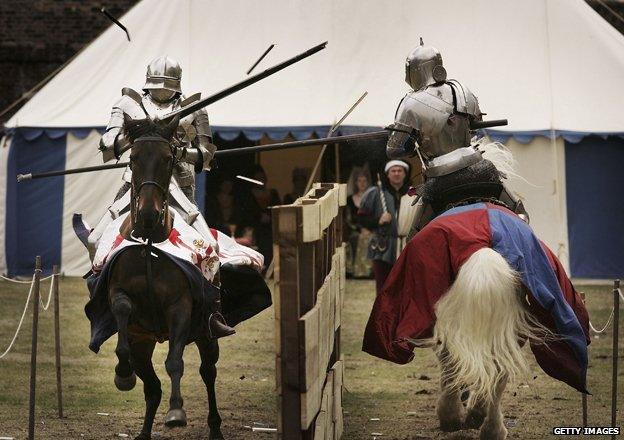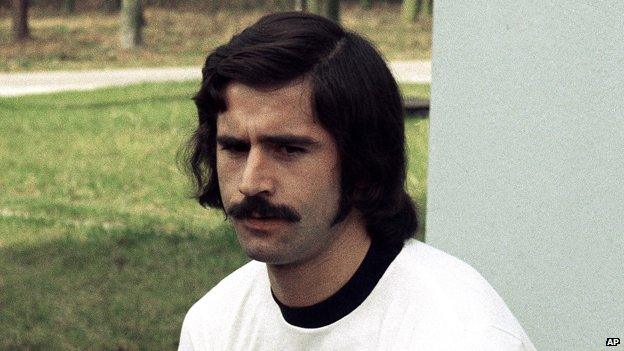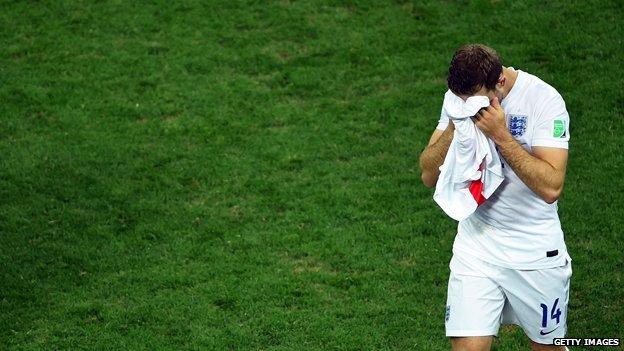Mullered and 61 other words for beaten at sport
- Published

Defeat is a word sport fans are all too familiar with. Why are there so many different words for being beaten, asks slang lexicographer Jonathon Green.
Dictionary-making moves on and no-one's perfect, but it is interesting to see that defeat, the word at which we might first look, does not cover sport. Or not in the still unrevised entry as included in the late 19th Century Oxford English Dictionary.
Defeat, which stems from French defaire (literally "unmake") is recorded in 1435 meaning "ruin" or "destroy". Other senses are listed, including that of slicing up a dead animal, but no sign of sport, even if prize-fighting and horse-racing, not to mention cricket, football, walking and cycling were all, as it were, up and running. Did everything end in a draw? A dead-heat? Hardly. But where are the words?
We are better served by beat - "To strike (a man or beast) with blows of the hand or any weapon so as to give pain; to inflict blows on, to thrash; to punish by beating," as the OED defines it.
First recorded around 970, its roots are in Old English and it offers a satisfactorily echoic thumping sound. Five centuries on and the definition has developed: "To overcome, to conquer in battle, or... in any other contest... to show oneself superior to, to surpass, excel."
There are some pleasing synonyms - shend (to humiliate, put to shame by superiority and linked to the German schande, shame), overwin (the aggressive antithesis of the persuasive "win over"), scomfit (ie discomfit, which also meant defeat 200 years before it evolved into confuse or disconcert), cumber (to encumber, presumably with embarrassment) and fenk (from French vaincre, to conquer).

Score draws were few and far between in medieval sport
There was also taken up for hawks, originally used of old horses which were slaughtered and their meat tossed to the hawks, latterly of those who failed to come up to scratch.
All gone now but no worries, we have plenty more. Sport lends itself to hyperbole, from the type of commentator who manages to turn "goal" into an extended polysyllable, to those who talk of the mother of all contests, the match of the century and of course label a championship played between teams mostly from a single country, "the World Series". Hype, lest we forget, is linked to slang's "hyper" - excitable, highly strung, over the top.
So if defeat is a little formal and beat too dispassionately factual, let's up the volume. Out by itself, and perhaps most extreme, is murder.


About the author
Jonathon Green is a lexicographer of slang, and author of several books, the most recent of which are Language! 500 Years of the Vulgar Tongue and Odd Job Man: Some Confessions of a Slang Lexicographer
10 slang phrases that perfectly sum up their era (BBC News Magazine, 19 May)

Slaughter is of course a perennial favourite, as are massacre and annihilate. Australia's stoush - sufficiently macho for some Australians to label World War One as the Big Stoush - is not far behind. War is also responsible for blast, blitz and blow away. And if the lads played badly, it was all a shambles, another word that refers to butchery - before it typically referred to "a mess", it originally meant an abattoir.
If the dial's on 11, then the noisiest synonyms for beating at sport are terms that otherwise mean "hit". Banjax, banjo, cane, clobber, knock out, thrash, lam, lash, lick, scupper, smear, thump, tonk, wallop, whomp and whop.
That final group, with their sense of hitting X with Y, might also belong to a subsection that I see as DIY - flatten, crush, mallet, nail, hammer, thump, shellack, screw and shaft (although that final duo might equally be bracketed with yet another group - those depressingly common synonyms for the F-word which mean violence as well as sex).
Then there is muller. It hurts me to pour icy water upon that straw-grasping desperation that is popular etymology - ie the jolly tales that seem so perfect when tracing a word's background. But muller does not refer to the player Gerd Muller, however much he stands out in the unfinished story of the great game that is England v Germany. Had it been so the term would have appeared after the 1970 World Cup when Muller so affronted England fans. It didn't. The first sighting is 1993. Nor would it equally often be spelled as mullah (and nor does it have religious origins). It comes from mull, which means pulverise. Smash into tiny pieces.

Gerd Muller

Footballer, born Nordlingen in 1945, played for Bayern Munich and West Germany
One of the greatest goalscorers of all time - scored 68 goals in 62 international appearances; at his club, scored 365 goals in 427 Bundesliga games and 66 goals in 74 European club games
Scored winning goal in extra time to knock out England in quarter-finals of 1970 World Cup

Muller's other quality is that, when turned into a past participle, ie with an added -ed, and like a number of these violent terms, it also means drunk. Thus we get smashed, belted, sloshed and wasted. Though a number of those already noted, such as banjaxed or caned, work for intoxication too.
One must not forget the domestic environment. These words for beat include clean out or clean up, roast, stuff, straighten, mop up, chew up, have for breakfast, take to the cleaners and wipe the floor with.
In the end, the headline writer is spoilt for choice. Let me, therefore, suggest some that seem to have slipped through the net. Ramscootrify (from Scotland's ramscooter, to induce panic, although an alternative definition was spray with a water-pistol), rumbusticate (which seems to combine "rumbustious" with the -ate suffix of words like "spiflicate").

England: Spiflicated, rumbusticated and ramscootrified
There is spiflicate itself (which the OED terms "fanciful" but others suggest combines one or more of "stifle", "suffocate" and the dialect words "smothercate" and "stiffle"). Finally scrumplicate which evokes the positive "scrumptious" but probably depends more on "scrumple" (to crush) and the crump of violent opposition.
Now, is that enough of a selection?
Subscribe to the BBC News Magazine's email newsletter to get articles sent to your inbox.